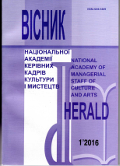TRANSFORMATION OF CULTURAL ENVIRONMENT IN THE CONTEXT OF DEVELOPMENT OF INFORMATION TECHNOLOGY
DOI:
https://doi.org/10.32461/2226-3209.1.2016.138472Keywords:
information technology, cultural environment, information culture, computer culture, technological Culture, virtual culture, subculture,Abstract
In the paper it is drawn attention to significant changes in the culture through modern information and communication technologies, including the standardization of cultural space, contradictory effects within mass culture, cultural expansion and, accordingly, the resistance against the latter, the protection of their cultural traditions and identity. Insufficient attention is paid to study issues of information technology in a culture that offers great opportunities for research and cultural analysis. The content of the key concepts of modernity that characterize the impact of information technology on culture are reviewed. Attention is paid to the expansion of intra-cultural entities, such as hackers, crackers and more. It is noted that computer technologies have created a new kind of culture, which, being a complex and multifaceted phenomenon, requires a thorough cultural reflection and analysis.
Downloads
Published
Issue
Section
License
Authors who publish with this journal agree to the following terms:
1. Authors retain copyright and grant the journal right of first publication with the work simultaneously licensed under a Creative Commons Attribution License International CC-BY that allows others to share the work with an acknowledgement of the work's authorship and initial publication in this journal.
2. Authors are able to enter into separate, additional contractual arrangements for the non-exclusive distribution of the journal's published version of the work (e.g., post it to an institutional repository or publish it in a book), with an acknowledgement of its initial publication in this journal.
3. Authors are permitted and encouraged to post their work online (e.g., in institutional repositories or on their website) prior to and during the submission process, as it can lead to productive exchanges, as well as earlier and greater citation of published work (See The Effect of Open Access).


